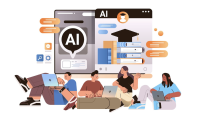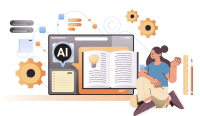Search
There are 10 results.
Category
Fostering Deep Learning and Motivation in the AI Era
As generative artificial intelligence (genAI) reshapes the educational landscape, faculty must rethink traditional assessment strategies to maintain academic integrity and real-world relevance. This piece explores strategies for creating effective assessments in an AI-mediated world, focusing on two key areas: collaborative activities that develop essential human skills, and formative assessments that emphasize personal growth and deep learning. These approaches not only address concerns about AI misuse but also prepare students for future workplaces where human capabilities will complement AI tools.
The Need to Rethink Assessments in the Age of Generative AI
The rapid advancement of generative artificial intelligence (genAI) technologies has sent shockwaves through the education sector, sparking intense debates about academic integrity, assessment practices, and student learning (Roe et al., 2023; Rudolph et al., 2023; Susnjak & McIntosh, 2024; Swiecki et al., 2022; Yeo, 2023). Since the public release of ChatGPT in November 2022, educators have grappled with concerns about cheating and the potential erosion of traditional academic values (Gorichanaz, 2023; Sullivan et al., 2023). However, as our understanding of genAI capabilities evolves, so too must our approach to assessment and teaching (Lodge et al., 2023).
Developing AI Literacy Across the Curriculum: A Guide for Programs and Faculty
The rapid integration of AI into professional practice across disciplines makes AI literacy increasingly crucial, not just for technology-focused fields but for all areas of study. Even faculty who are skeptical of AI's value need to consider how it's transforming their disciplines. For example, scientific fields are seeing AI adoption in literature reviews, experimental design, and data analysis. In the humanities, AI tools are already being used for textual analysis, translation, and content creation. Creative disciplines must grapple with AI's impact on artistic production and copyright. Professional programs face increasing pressure from employers who expect graduates to understand AI applications in their field.
Mapping Generative AI to Tailored Outcomes
Imagine planning a trip to a new city. A quick online search highlights the usual downtown tourist spots, but as you explore more, you uncover unique neighborhoods—a financial district bustling with experts, a hidden restaurant scene, and a college area alive with bookstores and cafés. Yet, none of these appeared in your initial search for “best places to visit.”
Navigating Late Policies Online
Late submissions can raise thorny questions for online instructors. While studies show that students who submit assessments before the due date receive higher-than-average grades, as many as 70% of college students identify as procrastinators (You, 2015). Despite instructor attempts to create a manageable workload and motivate students to submit assignments on time, it is inevitable that procrastination, combined with the competing obligations of online students, will result in occasional late submissions. When preparing for an upcoming term, it is a good idea to share a late policy that clearly communicates your expectations for student submissions (Santelli et al., 2020).
Integrating AI Into Assessments: From Policy to Practice
Conventional assessments, such as essays and multiple-choice questions, have long been the cornerstone of evaluating student performance. However, the widespread availability of generative AI (genAI) tools necessitates rethinking assessment methods. Now that genAI tools are readily accessible and rapidly improving, it is crucial to develop assessment approaches that maintain academic integrity while leveraging the benefits of AI to engage students and prepare them for the modern workforce (Yu, 2023).
Rubrics as a Tool to Support Equity and Inclusion
While student populations have become increasingly diverse, many groups, including first-generation, non-native English speakers, and individuals with disabilities, still face barriers and bias that can derail their success in college (Super et al., 2020). Traditional grading practices—including penalties for late work, writing in dialects other than standard English, and even plagiarism— are prone to bias and only perpetuate disparities (Feldman, 2019; Savini, 2021).
From Mapping to Refining: Prompting Techniques for Generative AI
This piece builds on a previous piece where we explored the importance of keeping your desired outcome in mind when working with generative AI (genAI). We also highlighted the value of including specific data and contextual details in your prompt to align with your goals. If you haven’t read that piece, we recommend starting there:
Harnessing the Third Space Theory for Effective Learning and Instructional Design Consultation
The Third Space theory, introduced by postcolonial theorist Homi K. Bhabha, explores a transformative space where new identities and meanings emerge through the interaction of diverse cultural elements. This "third space" is characterized by hybridity, challenging rigid, binary notions of identity and culture, and emphasizing fluid negotiations between dominant and marginalized perspectives (Burke, 2012; Lin, 2014). Bhabha’s theory builds on Ray Oldenburg’s (1999) concept of the "third place"—an informal public space where people gather to form a community that is neither home nor work—and extends it into the realms of cultural and social discourse, creating a broader framework for negotiating power, identity, and cultural exchange (Bhabha, 2012). These third spaces can emerge in a variety of contexts, including both physical locations like cafés or parks and virtual environments such as online forums or social media platforms, making the theory applicable to both in-person and digital interactions.










